Australian father pushed into the black market for medical cannabis to help epileptic daughter
Australian father pushed into the black market for medical cannabis to help epileptic daughter
- Katelyn Lambert used to suffer seizures lasting hours
- Her father refused to watch her suffer, turning to the black market for medical cannabis
- Katelyn now only suffers one seizure a year on average
- 3,000 medical cannabis prescriptions were approved by the Australian Government between March 2018 – January 2019
- Estimates suggest over 100,000 Australians turn to the black market for medical cannabis every year
Despite medical cannabis being legally available in Australia, hundreds of thousands of desperate patients are turning to the black market to acquire the medication they need.
One of those is brave parent Michael Lambert, who decided that breaking the law, risking his freedom, was a small price to pay to help ease his epileptic daughter’s suffering.
Katelyn, 7, was diagnosed with a drug-resistant form of epilepsy, Dravet Syndrome, as a child. Her family were told there was only a one-in-six chance she would live to see 18.
Katelyn was suffering a life-threatening seizure every 15-20 seconds, lasting for hours, when she was just 11 months old.
Now aged seven, she only suffers, on average, one seizure a year.
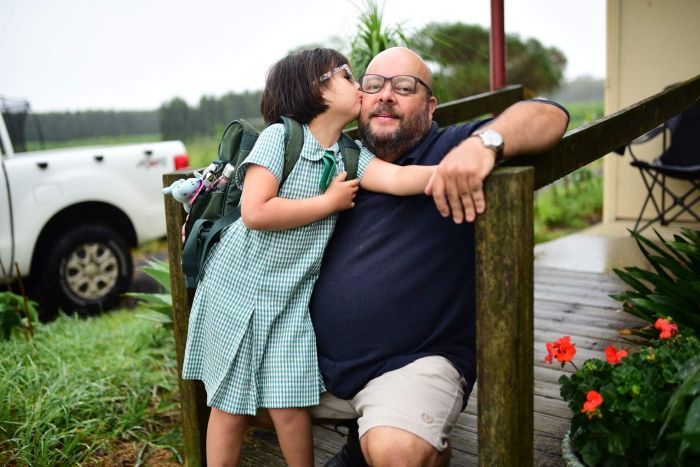
Michael attributes this amazing turnaround to medical cannabis, which he has been providing to her for the past five years. Even Katelyn’s doctors are acknowledging the amazing progress.
Just five drops a day of cannabis oil acquired illegally from the black market has been enough to bring Katelyn a vastly improved quality of life.
ABC also revealed that more than 3,000 medicinal cannabis scripts have been approved by the Therapeutic Goods Administration (TGA) from March 2018 to January 2019, so why are families like the Lamberts forced to turn to the black market for life-saving medication?
In a similar situation to the UK, Australian medical cannabis patients are in legal limbo.
Cannabis, like in the UK is de jure legal for medical purposes. In reality, only a few, rare medical conditions qualify for cannabis prescriptions. Those who qualify then face an uphill struggle to afford the costly prescriptions.
Iain McGregor, a psychopharmacologist at the Lambert Initiative For Cannabinoid Therapeutics at Sydney University, estimates 100,000s of Australians are using illegal cannabis for medical problems.

To try and tackle the ever-growing backlog of patients demanding legal access to medical cannabis, the Australian Government announced a streamlined application process for medicinal cannabis last year, which would allow approved patients to get access to the drug in 48 hours.
Speaking to the Australian news network, ABC, Michael challenged the claims that the process for applying for medical cannabis had been made easier:
“Everybody knows from the Health Minister to the Prime Minister, I wrote to them all, I begged for help.
“They told me, ‘We’re going to come up with a solution, just hang in tight’, but I’m worried that the next package is not going to arrive, that my daughter’s going to get electrocuted to death in front of me, because she’s missing the most vital ingredient in her medicines.”
There are three legal routes patients can take to legally access medical cannabis in Australia:
1: Clinical trial
Patients can apply to participate in a clinical trial to help study the potential medical applications of cannabinoids.
Researchers in New South Wales are currently investigating cannabinoid-treatment on children with drug-resistant epilepsy.
However, limited spots mean only around 100 children have been accepted onto the trial. Unfortunately, Katelyn was not on the list.
2: Find an Authorised Prescriber (AP)
Doctors who are APs can prescribe specific cannabinoid medications.
The process of becoming an AP is notoriously difficult, as medical practitioners must gain approval from the Therapeutic Goods Association (TGA), obtain endorsement from an ethics committee, check for additional state or territory requirements, and finally, provide the drug supplier their authorisation.
This is a largely untenable option for many patients hoping to acquire medical cannabis prescriptions as privacy laws in Australia prevent people from searching for an AP.
3: Special Access Scheme (SAS)
The SAS allows doctors in most Australian states and territories to apply for Commonwealth and state approval in an online application.
However, most patients are finding it impossible to find a doctor willing to go through this process. Experts believe a lack of willingness from doctors is the cause of this unwillingness.
“We have not educated our GPs, the medical schools don’t know enough about [medical cannabis]… at the moment it’s pretty raw, it’s early days.”
– Dr Sanjay Nijhawan from Cannabis Access Clinics
Speaking to ABC, Dr Sanjay Nijhawan from Cannabis Access Clinics, said a lack of awareness had discouraged doctors from engaging with it:
“We have not educated our GPs, the medical schools don’t know enough about it… at the moment it’s pretty raw, it’s early days.”
This is the current route Michael has taken to get his child legal access to medical cannabis, but the high cost of the prescription makes this an untenable option in the long-term.
Katelyn’s current dose of MediCabilis had been obtained through the SAS and did not come cheap.
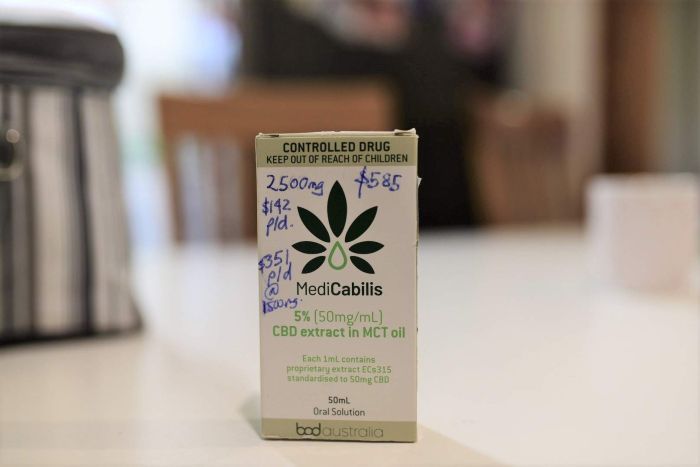
A bottle which would last Katelyn four days cost $585.
Michael explained why the high cost of this legal prescription could force him to return to the cheaper black market:
“The minimum dose recommended on the bottle is $140 a day and I can get it [for] $7.50 a day on the black market.
“I’ve got three choices — don’t give it to her and injure her, keep breaking the law or what extra job am I going to get to pay for it?”
References and further Reading
Irish Father avoids jail after growing medical cannabis for his epileptic son
Irish Father avoids jail after growing medical cannabis for his epileptic son
- An Irish father escaped jail despite being found with 16 cannabis plants
- Derek White grew the plants for his Crohn’s and his son’s Autism
- The plants were a high CBD low THC strain
- This is the first time an Irish court has recognised medicinal use as a defence
An Irish father who grew cannabis to extract into a medicinal oil for himself and his son received a fully suspended sentence earlier today, 22 Feb 2019.
Derek White, from Dublin, pleaded guilty to ‘unlawful possession of cannabis’ at his home on July 11, 2016.
Despite being found with 16 cannabis plants in a grow tent, White made Irish law history by successfully using medicinal use of cannabis as a defence, potentially setting a precedent for future cases.
Gardaí (Irish police) searched White’s house after discovering a small amount of cannabis in his car, finding the plants in a tent upstairs. The police valued the plants at €12,800.
White was sentenced to two years imprisonment, but Judge Cormac Quinn suspended the entirety of the sentence, providing he ‘keeps the peace and be of good behaviour’ for a period of two years.
Despite cultivating cannabis being illegal in Ireland, White was shown sympathy by Judge Quinn due to the plants being grown to make medicine for his Crohn’s and his son’s Autism.
White explained to us how his son’s Autism sparked his medical cannabis journey, thanking the judge for his compassion:
“Everything came down to the judge. Thankfully, he entertained all the evidence we presented, proving the cannabis was for my Crohn’s and my son’s autism.
“That’s how I started on my medical cannabis journey, in 2015.
“Due to my son’s Autism, he was going through a tough stage in life. He was quite aggressive and wasn’t able to channel his frustration.
“We tried a few different CBD supplements, but they didn’t work.
“We were introduced to a strain of cannabis called CD-1, which is high in CBD and very low in THC.
“After just a few weeks of oils I made myself using CD-1, we saw a positive change!”
White and his barrister were able to present lab reports from the cannabis he was growing, as well as the oil he was making, including information on the percentages of THC and CBD.
Pieter Le Vert, White’s barrister, was able to use these reports to demonstrate that his client was growing cannabis “specifically designed to not get one high.”
“We were able to present evidence of lab test results from both the oil and from the flowers I was growing,” Derek explained.
“From the oil, the results showed there was 60.15% CBD and 4.5% THC.
“It’s such an amazing strain, I never had bad results from it, it really helps both me and my child.”
“After just a few weeks of using CD-1 we saw a positive change!”
– Derek White, Father and History Maker
The low-THC content, coupled with a lack of trappings of wealth in the house, convinced Judge Quinn that White was not supplying others or benefiting financially, that his motivation was medicinal and that he is the sole carer of a son on the autistic spectrum.
“I think that’ll set a precedent,” said White, “especially as national news has picked my story up.”
“It’s now been accepted in court now that CBD is medicinal, and there’s a difference between recreational and medical cannabis.
“It’s first time in Ireland they’ve recognised and accepted the argument. I’m so relieved.”
White now relies on buying hemp, legal in Ireland and the UK, in bulk to extract and make a similar oil for medicinal purposes.
Derek White’s inspiring battle to help his son may have altered the course of medical cannabis in Ireland.
With a judge accepting that the cannabis he was growing was for medicinal use, rather than recreational, could help other patients facing prosecution for growing their own medicine.
Should the British judicial system maintain its current stance on medical cannabis, pursuing prosecution against patients in similar situations to White and his son?
Alzheimer’s Research UK donates £300,000 to fund medical cannabis trial
Alzheimer’s Research UK donates £300,000 to fund medical cannabis trial
- Dementia affects around 850,000 people in the UK
- Alzheimer’s Research UK has donated £300,000 to fund a clinical trial looking into the effectiveness of cannabis at treating Alzheimer’s
- Sativex will be the cannabinoid-based medication used in the trial
- Currently, Sativex is only licensed in the UK to treat MS
Alzheimer’s Research UK has announced that it will be providing funding for a medical cannabis-based clinical trial at King’s College London.
The investigation will look into the efficacy of cannabis as a treatment for dementia patients.
Patients suffering from Alzheimer’s not only experience memory loss, but can also experience symptoms of agitation and an increase in aggressive behaviour.
Of the 850,000 people living with dementia in the UK, around half of patients experience the latter symptoms.
Alzheimer’s Research, the UK’s largest dementia research charity, has committed nearly £300,000 to the Sativex® for the Treatment of AgitatioN in Dementia (STAND) trial, which will investigate the effectiveness of cannabis at reducing agitation in Alzheimer’s patients.
Sativex, a pharmaceutical, cannabinoid-based 1:1 ratio (CBD:THC) spray, is currently only licensed to be sold to MS patients to help relieve muscles spasms and tightness. It is produced by GW Pharmaceuticals.
The study will be conducted at King’s College London.
Volunteers with Alzheimer’s, aged between 55-90, who live in care homes and display symptoms of aggression or agitation will be chosen for the study.
Participants will be given Sativex for four weeks, with researchers comparing the results from the control group and those given the pharmaceutical spray.
“Current treatments for behavioural and psychiatric symptoms of dementia are very limited, and we desperately need to develop alternatives.“
– Prof Dag Aarsland, the lead researcher on the STAND trial
Explaining why research into medical cannabis as a treatment for dementia, Prof Dag Aarsland, the lead researcher on the STAND trial, said:
“While people most often associate Alzheimer’s disease with memory problems, this is just one aspect of a complex condition that can affect people in different ways.
“Many people with Alzheimer’s can become agitated or aggressive, and this can pose difficulties for the person with the condition and those closest to them.
“Current treatments for behavioural and psychiatric symptoms of dementia are very limited, and we desperately need to develop alternatives.
“Doctors sometimes prescribe anti-psychotic medications, and while these drugs can have important benefits, these need to be weighed against the risk of very serious side effects.
“One of the key questions the STAND trial will answer is whether it is practical to give someone with dementia a drug through a mouth spray when they may be exhibiting severe symptoms of agitation and aggression.
“We will also get some indication of whether Sativex is effective at reducing symptoms, although larger studies will be needed to get firm evidence of this.”
Discussing why his charity decided to fund the ground-breaking research, Dr David Reynolds, Chief Scientific Officer of Alzheimer’s Research UK, added:
“With no new dementia treatments in over 15 years, it is vital that we test a wide range of approaches to find effective ways to help people living with the condition.
“While a major focus for dementia research is to develop drugs that slow or stop the progression of the physical diseases that cause dementia, what really matters is that a medicine benefits people’s day-to-day lives.
“The STAND trial opens the door to a treatment that may help to alleviate an extremely challenging set of symptoms, and Alzheimer’s Research UK is extremely grateful to our supporters for making this important work possible.
“This is a rigorous clinical trial of a medication that has been carefully prepared, and which will be tested in circumstances where the health and wellbeing of participants can be closely monitored.
“There is no good evidence that using cannabis in an uncontrolled setting could benefit people living with dementia, and we know that the drug can involve risks including short-term memory and thinking problems, coordination difficulties and anxiety.”
British Company gets first legal license to grow medical cannabis on Guernsey
British Company gets first legal license to grow medical cannabis on Guernsey
- The Original Alternative has secured permission to start growing cannabis, not hemp, on the island of Guernsey
- Plants and cannabis products can have as high as 3% THC on Guernsey
- Mainland customers will not be able to purchase THC containing oils
- “Guernsey has opened up a world of opportunities for us.”
Guernsey’s Government has approved the island’s first legal medical cannabis farm, bringing hope to patients on the small island.
Celebrated Limited, trading as The Original Alternative (TOA), have been granted permitted to cultivate and process cannabis containing THC as well as CBD, a “revolution” for both the island and the OA.
The license was granted by the Committee for Health & social care under strict requirements which were negotiated between Guernsey’s Government and Green Star Consultancy.
Discussing their new license, Ben Birrell, co-founder of The Original Alternative, expressed his delight at the opportunity to provide cannabis medicines containing THC, and what the future holds for the company.
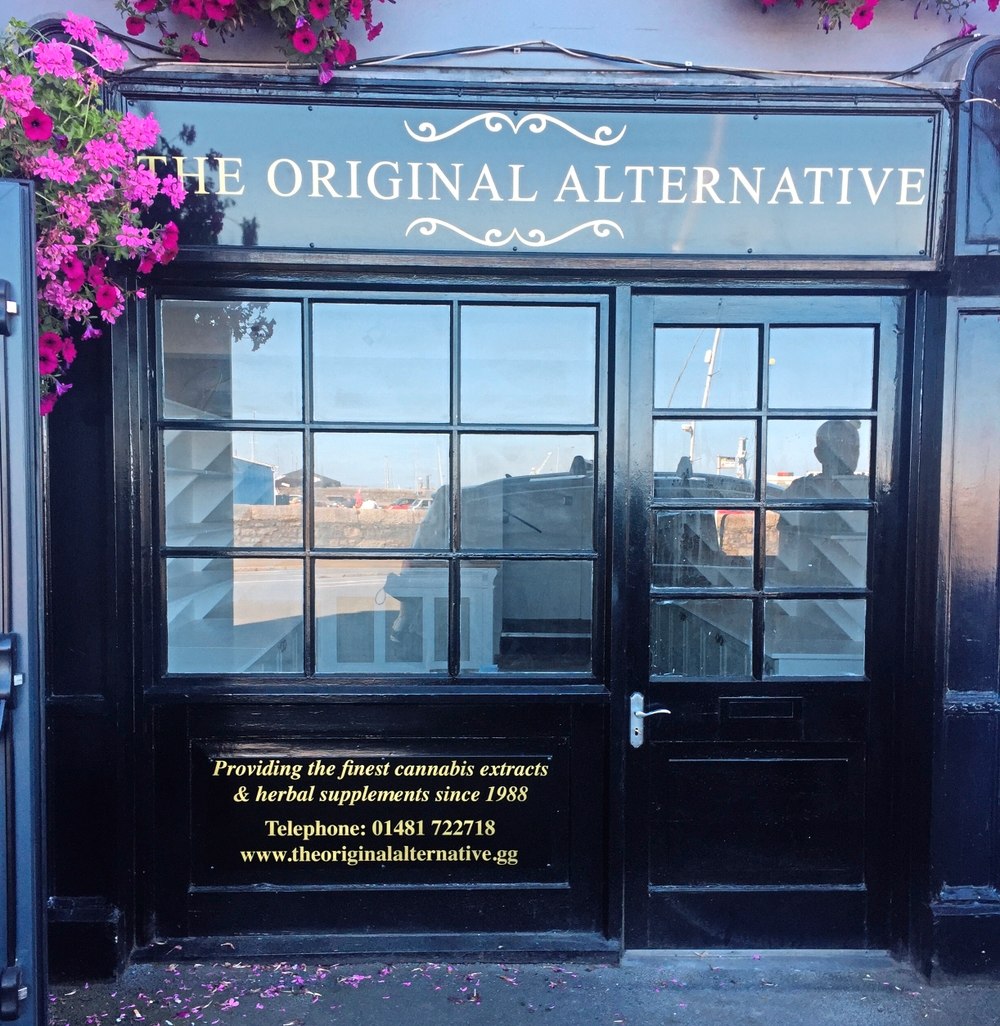
“It’s a dream come true.
“To be able to grow and manufacture actual cannabis is a wonderful thing.
“I’m so proud to be a part of this progress. I had tears in my eyes when we got the news!
“To have this [license] finally granted to us is something we are very moved by. It feels like the accumulation of years of work is finally paying off!”
Looking at the bigger picture, Ben told us how he sees the move as just the first step to expanding into the ever-growing global market of medical cannabis users.
“It gives us the opportunity to evolve the business from a food supplement seller to a world leader in medical cannabis,” Ben explained.
“It also gives us more funding to further research our own products. I believe this can help us compete with pharmaceutical giants like GW Pharmaceutical.
“It’s wonderful for cannabis in general!”
The example Guernsey’s Government has set by granting a medical cannabis license to a non-pharmaceutical company could send shockwaves through mainland Britain’s Government.
“If Guernsey can rethink THC legislation, I don’t see why this can’t have a positive impact in the UK’s Home Office,” Ben said.
“Our goal is to delve into markets in Canada and across the world. We want to match our products to their individual regulations.
To gain the license, Ben and his team had to adhere to strict regulations which put patient safety first.
“We’ve spent over two years working towards this, working very closely with Guernsey’s Government.
“There were very strict criteria to adhere to,” Ben added. “Transparency and accountability are at the heart of the project.
“The Guernsey government have pushed and encouraged us, I cannot emphasise how much detail has gone into this!”
One of the conditions the farm will have to meet concerns THC levels. Guernsey allows a higher threshold for THC than mainland Britain, up to 3%.
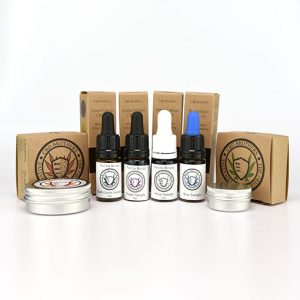
Finished products, such as cannabis oil, will be allowed up to 3% (as a percentage of the whole product).
The strain the farm will be growing, Guernsey Gold, will be a Government approved one, with a ratio of 20:1 CBD-THC.
Unfortunately for British patients, the OA’s THC-containing products will only be available to patients on Guernsey.
While the company has acquired a license to grow cannabis for medicinal purposes on Guernsey, they are still classified as a food supplement company, thus must refrain entirely from mentioning the potential medicinal benefits their products can have, despite overwhelming scientific evidence in support of CBD and THC in healthcare.
“We cannot sell our products as medicine at this point in time,” Ben explained, “but we’re looking at entering that market at a later date.”
The farm contains a 2 acre of glasshouse, a state of art security system, and the company will be working very closely with law enforcement on the island to ensure public safety.
The farm will also employ a state-of-the-art software system, which IDs every single plant, meaning plants cannot be moved offsite without activating an alarm.
There are also onsite processing and testing facilities, meaning everything from seed to oil can be done in one place.
Looking to the future, Ben hopes that this move can ignite similar progressive thinking in the mainland Government.
“Hopefully we can show that this model works and gain trust from the Home Office, they can sit down and discuss with us”.
“It’s a dream come true. To be able to grow and manufacture actual cannabis is a wonderful thing.“
– Ben Birrell, co-founder The Original Alternative
Resistance from the British Government to expanding medical cannabis projects led Ben and his team to look at opportunities elsewhere.
“The laws over here are archaic,” Ben said. “There are no two ways about it.
“We tried to apply for a license in the UK, but they’re not very keen to help anyone who isn’t heavily funded by established Pharmaceutical companies.
“Guernsey has opened up a world of opportunities for us.”
Initially, the news that a cannabis farm would be opening on the island gathered negative attention from locals, but Ben explained how they’ve noticed a positive change in opinions as the project has progressed:
“Comments on local newspaper website were very negative initially, but after we opened our first shop on the island, and people got a better understanding of what we do, there’s been a positive shift in opinions.
“As knowledge grows, so does consensus!
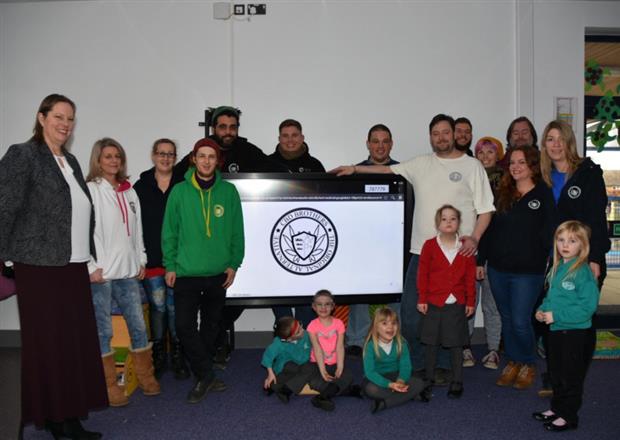
“Also, more people are starting to see the benefits of our presence.
“Economically speaking, the financial implications of this can be huge! Hopefully, it can help bring a new revenue stream into the island.
“We’re employing local people to help run the company and keep the money circulating in the community; locals are not only helping run the shop, but they’re involved in the construction and security.
“It’s important for us to recycle money back into the local community.”
When Canada first legalised cannabis, there were reports of products containing dangerous levels of pesticides and heavy metals, something Ben and his team are driven to avoid:
“We’ve spent half a million on analysis equipment.
“Our products are completely pure and clean; in Canada, there were reports of products containing lots of pesticides, so you really have to be very careful.
“It’s a food supplement, so we need to keep to high standards of food. We need to be accountable.”
With Guernsey giving the green-light for its first medical cannabis farm, will Ben and TOA achieve their wider aim to help revolutionise the way Westminister approaches medical cannabis? Only time can tell.
European Parliament votes on resolution calling for wider legalisation of medical cannabis
European Parliament votes on resolution calling for wider legalisation of medical cannabis
- MEPs have voted to pass a resolution which will help advance medical cannabis in the EU
- It focuses primarily on increasing scientific research on cannabis in EU countries
- The resolution is non-binding
An early Valentines present for medical cannabis patients across the EU came today, as the EU voted to pass a key resolution which should progress cannabis legalisation in EU countries.
The vote follows the World Health Organisation’s (WHO) recommendation to reschedule cannabis, including cannabinoids like the psychoactive THC.
The draft resolution “stressed the need for the Commission and national authorities to draw a clear distinction between medical cannabis and other uses of cannabis.”
MEPs called for the resolution as they are under the belief that “there is substantial evidence that cannabis and cannabinoids have therapeutic effects for treating chronic pain in adults, chemotherapy-induced nausea and vomiting, and improve muscle spasticity symptoms in multiple sclerosis.”
The resolution primarily focused on increasing the amount and quality of scientific research and clinical studies in EU member states.
MEPs called on the Commission and member states to “address regulatory barriers which burden scientific research and invites them to properly fund research and promote greater knowledge of medical cannabis among medical professionals.”
While the resolution is non-binding, the vote highlights the increase in support for medical cannabis in world governments. Countries within the EU can still prohibit access to medical cannabis to their patients.
Earlier this week, Irish Independent MEP, Luke Flanagan, rallied support in the EU Parliament, calling for legislation which would help families access medical cannabis.
Flanagan has been a vocal supporter of Ava Twomey, 9, who suffers severe epilepsy.
Vera, Ava’s mother, has made headlines across the world with her campaign to get legal access to medical cannabis for her daughter.
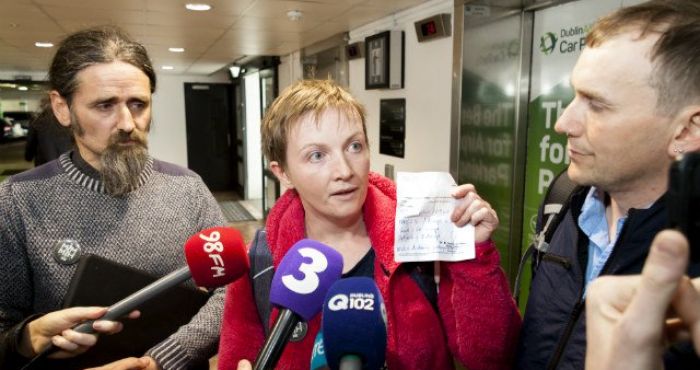
Speaking in the EU Parliament, Mr Flanagan said: “We need to see an end to the situation whereby people such as Vera Twomey and her husband Paul must, in spite of getting a licence to treat their daughter’s debilitating illness, travel six times a year to the Netherlands to get this medicine.
“They should be able to source this medicine locally. Either that or the importation of this proven medicine is delivered to their house.
“Freedom of movement of goods is meant to be one of the cornerstones of this European Union. Let’s make the freedom of movement of this medicine a reality.
“Vera Twomey and her husband Paul have woken hundreds of thousands of people up to the fact that medicinal cannabis can help, their nine-year-old daughter is now seizure free and the constant trips to the hospital can become a thing of the past.
“Eva now has a future we need a future be made available to all who need it.”
“Freedom of movement of goods is meant to be one of the cornerstones of this European Union. Let’s make the freedom of movement of this medicine a reality.“
– Luke Flanagan, Irish MEP
Discussing the vote in Forbes, Tom Angell, publisher of Marijuana Moment, explained how despite the resolution being non-binding, it should still be viewed as a positive step forward for the global legalisation effort:
“The EU Parliament is just the latest voice to recognise the medical value of cannabis and the benefits of regulation over prohibition.
“I’m hopeful that the growing chorus in favour of reform will spur action by nations to change their policies and improve access for patients who need this medicine.”
Will the Government listen to the EU while Brexit still looms over a fractured British Parliament?
While cannabis was de facto legalised for medicinal purposes in November 2018, the reality for British patients is the polar opposite.
Only a handful of private prescriptions have been granted to patients, exclusively reserved for severely epileptic children.
With this resolution passing, could we see wider-access to medical cannabis products for EU citizens, or will individual Governments continue to deny their citizens a right to safe medication?
School nurses in Colorado can now treat students with medical cannabis
School nurses in Colorado can now treat students with medical cannabis
- Bill HB18-1286 will allow nurses to give children at school medical cannabis
- Children will require a note from their parents and school principal
- Previously parents were allowed to come into schools to administer medication
- Medicines must be non-smokable
Colorado has taken another step forward in improving healthcare for medical cannabis patients.
A new law signed this week by Colorado Governor, John Hickenlooper, will allow school nurses in the State to administer non-smokable medical cannabis products to children.
Laws in Colorado previously allowed parents to come into school to give their children medical cannabis, usually for treating epileptic seizures.
Now, following the introduction of bill HB18-1286, parents will no longer need to take time out of their day to come into schools to give their children medical cannabis, provided there is a written agreement between parents and the school’s principle.
Parents will be required to bring in a doctors note which informs the nurse about how much and when to administer.
The medical cannabis must be non-smokable (i.e. oils, tinctures or balms), and stored in a locked cupboard.
Students will not be permitted to bring medical cannabis in on a school bus or carry it to the nurse’s office; this must be done by parents.
Hickenlooper explained that he signed the bill into law due to these protections in a letter:
“In evaluating this bill, we spoke to parents whose children are medical marijuana patients.
“We find their reasoning and advocacy very compelling, especially that of Ms. Hannah Lovato and her son Quintin who inspired the bill.”
“In evaluating this bill, we spoke to parents whose children are medical marijuana patients.“
– Colorado Governor, John Hickenlooper
The law has been given the nickname the “Quintin Amendment” after third grader Quintin Lovato, 9, the poster-boy of the campaign to legalise medical cannabis treatments in schools.
Lovato’s suffers from epilepsy and Tourette’s, requiring three daily doses of CBD oil to help reduce his seizures and tics.
While his parents were able to give the child his medication in the mornings and evenings, his parents struggled to get to his school to medicate him.
Hickenlooper mentioned in the letter how he consulted parents whose kids are prescribed medical medical and found their “reasoning and advocacy very compelling.”
While children in Colorado can now medicate safely in schools, their British equivalents are still being denied legal access to the same products.
Compassion and science should inform and direct policies, especially when children’s wellbeing are at stake.
Write to your MP today to ask for their view of medical cannabis to help raise awareness of how many potential medical cannabis patients are in their constituency
References and further Reading
Philippines passes bill legalising medical cannabis
Philippines passes bill legalising medical cannabis
- Medical cannabis will be legalised in Philippines after historic vote
- The bill passed 163-5-3
- The country’s former President has admitted to using medical cannabis where it is legal
- Any patient suffering from “debilitating medical condition” will qualify
Medical cannabis has effectively been legalised in the Philippines following a historic vote.
The House of Representatives voted 163-5-3, approving the third and final reading of House Bill 6517 or, “the Act Providing Compassionate and Right of Access to Medical Cannabis and Expanding Research…”
The bill will bring legal access to medical cannabis to patients suffering from a wide range of debilitating medical conditions.
According to Bill 6517, patients suffering from any diseases which cause chronic pain, seizures, persistent muscle spasm, nausea and wasting diseases.
Patients qualify to use medical cannabis if they are diagnosed as having a “debilitating disease,” and will be issued with special identification cards, much like in California.

Licensed doctors, authorised by Philippine Drug Enforcement Agency (PDEA) would need to evaluate individual patients, determining if they medical cannabis could provide “therapeutic or palliative benefits.”
Patients who qualify would then have the right to a choice in the type of health care service and medication they are provided, putting Britain’s current regulations on medical cannabis to shame.
There will also be licensed medical cannabis caregivers, who will be issued special identification cards by the DOH Secretary.
The medical cannabis caregiver can attend to only one patient at any time.
Likewise, medical cannabis patients will also be issued special identification cards.
Under the bill, “medical cannabis compassionate centers” would be created, which would handle the day-to-day dealings of the medical cannabis regulations including purchasing, supplying and delivering/dispensing medical cannabis to patients.
The bill also paves the way for more extensive research on the potential medical qualities and applications of cannabis, with the establishment of a “medical cannabis research and safety compliance facility.”
The Philippines’ Department of Health has been tasked with running these new facilities, as well as creating an advisory committee on the medical use of cannabis, which would create and implement provisions of the Bill.
The PDEA will help regulate and monitor the new regulations.
“I really believe in medical cannabis.“
– Gloria Macapagal-Arroyo
The bill’s passage through the House is not a surprising one, given the support it has been given by former President, and current Speaker of the House, Gloria Macapagal Arroyo.
Arroyo has openly admitted that she uses medical cannabis to help relieve the intense pain she experiences due to multiple cervical spondylosis (degeneration of intervertebral discs), causing pain in the spine.
The speaker uses cannabis patches whenever she visits a country where she can find legal access to cannabis.
Discussing her support for the bill, Arroyo explained:
“I am an author of that (medical marijuana bill).
“I really believe in medical cannabis. As you know, I have my problem here and when I’m in a country that allows it, I put a pain patch, but here in the Philippines, I cannot do it.
“So I authored that bill because I believe that it can help me and many other people.”
While patients in the Philippines will soon be enjoying legal access to a safe and effective medication, patients in Britain have been left behind.
Only a handful of patients have been able to acquire a prescription to medical cannabis in the UK.
Even if a patient is able to get a prescription, it is often a private one, costing £10,000s per year, pricing out the majority of families.
Every patient, regardless of wealth, should have choice in their healthcare and medication, especially if they are resistant to other, Pharmaceutical medications.
Patient well-being should be Britain’s priority, not profit.
Uruguayan cannabis companies to begin exporting to other countries
Uruguayan cannabis companies to begin exporting to other countries
- Uruguay legalised cannabis in December 2013
- Citizens can legally purchase, use and grow cannabis at home
- The country now hopes to become a world leader in medical cannabis exports
Uruguay rewrote history in 2013 when the country became the first to fully legalise cannabis for recreational use for all citizens.
Citizens and legal residents over 18 years old are legally allowed to purchase, recreationally use and cultivate cannabis at home.
Cannabis sales are exclusively managed through a government-run permit system, normally sold in pharmacies, with officials legalising the export of cannabis to countries where medical cannabis is legal.
No companies currently export, but many have been lobbying, claiming selling medical cannabis products to foreign markets could be essential to staying ahead of the game, with the hope to transform Uruguay into a leader in the medical cannabis market along with Israel, Canada, and the Netherlands.
Dixie Brands, a Colorado-based cannabis company recently partnered with Khiron Life Sciences, a Toronto company, to acquire Dormul SA, which has a license to produce medical cannabis in Uruguay.
Discussing their plans to expand into the Uruguayan market and beyond, Chuck Smith, chief operating officer of Dixie Brands, said:
“The Latin American market is poorly supplied and is growing.
“Uruguay is taking a leadership position in growing high CBD, high-value hemp products.

“So we see that as a great opportunity from a supply chain perspective.”
The merger will allow Khiron to export medical cannabis from Uruguay to Brazil due to the regulations of the Mercosur trade bloc.
Fotmer, a cannabis plantation about 130 kilometers west of the Uruguayan capital of Montevideo, currently employs 80 people and is investing $7 million in laboratories and 10 tons of crops that it hopes to ship to countries including Germany and Canada, which is struggling to overcome supply shortages in its cannabis market.
There are 35,000 cannabis plants on the plantation, sheltered in 18 large greenhouses measuring.
It’s expected that Fotmer’s first crop will be harvested, and processed for oil, in March.
The oil, containing both THC and CBD, will be extracted in its labs to produce a variety of medical cannabis products ready for export, including tinctures, balms, pills, and other treatments for cases of chronic pain, epilepsy and chronic pain.
However, there is one main issue preventing Uruguay from truly dominating the South American market: there is no market in South America for legal cannabis.
Surrounding States, including Panama, Ecuador, El Salvador, and Cuba have yet to introduce any policy relaxing their stance on cannabis, either recreational or medicinal.
Exporting cannabis products also needs to conform to a complicated structure of international regulations, which are still being developed.
Given the fact that Uruguay is the only South America country to legalise cannabis does give it a great head start.
“Uruguay is taking a leadership position in growing high CBD, high-value hemp products.“
– Chuck Smith, chief operating officer of Dixie Brands
Diego Olivera, head of Uruguay’s National Drug Secretariat, explained how the country’s revolutionary cannabis law, along with its strong rule of law and transparent institutions, gives it a head start:
“Uruguay today has a dynamism in the cannabis industry that is very difficult to find in other sectors.”
While countries like Uruguay are hoping to become a world leader in cannabis exports, Britain already has a dominance.
The UN found Britain to be the world’s largest exporter of cannabis in the world, despite denying it to its own citizens.
This disgusting hypocrisy leaves an even sourer taste in the mouth when one takes into account the fact that Theresa May’s husband owns shares in the company which is exporting the illegal product.
If Britain does not take action soon, we could be left behind in one of the world’s most valuable markets. Or rather, the people of Britain will miss out, while those in power massively profit from the healing plant.
References and further Reading
British woman successfully treating breast cancer with medical cannabis
British woman successfully treating breast cancer with medical cannabis
- Fiona Russell was diagnosed with breast cancer in 2015
- After using medical cannabis, her tumour went from level 3 to level 2
- Over 55,000 women are diagnosed with breast cancer each year in the UK
- Nearly 1,000 women still die of breast cancer every month in the UK
Over 55,000 women are diagnosed with breast cancer each year in the UK, with nearly 1,000 dying every month from the common cancer.
Success rates are relatively high in breast cancer, with 78% of those diagnosed with breast cancer living for 10+ years after initial diagnosis.
Chemotherapy is the most commonly used treatment for cancer in the UK, but some patients are now choosing not to suffer under the notoriously detrimental side-effects that comes with it.
One of those brave women is Fiona Russell, a British physiotherapist.
Fiona exclusively shared her amazing story of self-treatment with cannabis and meditation with us, in the hope that it may inspire other cancer patients to take their destinies into their own hands.
Fiona told us how she discovered she had breast cancer:
“I found a lump in my right breast towards the end of September 2015. I never thought that I would find a breast lump and so suddenly. One day it was just there.
“I didn’t immediately go to my GP. I went in November after a trip to Bali, and although I told him I wouldn’t take orthodox treatment, we decided that it was best to have it officially diagnosed anyway.
“I went in to have test done in December, expecting to get the results at the end of that week.
“After the test, I was then put in a consulting room to see the consultant. She came in, barely introduced herself and said told me to ‘expect the worst, as it looks like the worst,’ and walked out.
“I was stunned. What kind of person makes that kind of statement to a patient?
“One who obviously has no clue about the placebo and nocebo effect. This is what makes me very cross about the NHS.
“Some medical professionals seem to be oblivious to the nocebo effect, and their position of responsibility in the well-being of their patients.
“The following Friday, I sat in another consulting room waiting for the results. The same consultant came through a side door, accompanied by another lady who I presumed was a nurse.
“She stood at the end of the treatment couch and proceeded to blast me with the results while I sat rather like a deer in the headlights, telling me what they would do for my condition and then recused herself.”
Deciding to go with alternative treatments to chemotherapy, which is infamous for its horrendous side-effect, can come across as a mistake by medical professionals, as Fiona explained:
“The nurse sweetly took over, wanting to reassure me of their care, to which the words quietly came out of my mouth: ‘yes but I don’t want to do any of that thank you.’
“I did manage to say I would be happy for them to follow my progress, having worked in the NHS and respecting the establishment.
“The nurse told me this wasn’t possible.
“I went to my car and sat for a moment, had a little cry and decided that was the last time I would allow myself to be pushed into victimhood and I would continue with my healing, the journey I knew I had started on some years before.
“We have the power of self-healing within us.
“We are the ones who can find the right route for ourselves. The right things will come to us if we trust in ourselves.”
Medical cannabis offers patients the choice of self-determination.
Chemotherapy has a notoriously detrimental impact on people’s health. While it has a relatively high success rate, especially in breast cancer, the toll it takes on patient’s mental and physical health is one of the main reasons many choose medical cannabis instead.
Fiona discussed how someone close to her had previously gone through with the chemo option:
“2 years before my diagnosis, my mother’s partner’s daughter, who is a little younger than myself, was diagnosed and had opted for the usual Chemotherapy option.
“I had wanted to send her information on alternatives because I knew Chemo and Radiotherapy therapy were not a good option.
“Anything that knocks out the immune system when you are needing it most was ridiculous to me.
“Now I see it as abusive!
“I believe that not too far in the future we could see people actually suing the NHS for abuse as the truth is simply being ignored.
“Doctors are clever people and to not be following up on this kind of information could be said to be unethical and they could be found liable.”
Discussing her decision to reject the chemotherapy option, Fiona explained how she first came across medical cannabis, along with other alternative, natural treatments for her cancer:
“I first discovered medical marijuana on my social media feed around 6-8 years ago, mainly via Rick Simpson’s story. I also took an interest in Bruce Lipton’s research on Epigenetics and spontaneous healing.
“I had taken up a bioenergetic mediation practice in 2009, and noticed as a physiotherapist how patients physical symptoms were driven by their emotional state and belief system, i.e. if a patient believed they could get better, they would, if they didn’t, they wouldn’t.
“I was discovering how good meditation was for releasing negativity from the body, allowing it to heal.”
Inspired by research on the power of positivity and the potential cannabis could have, Fiona decided to make cannabis oil at home:
“I began watching videos on how to prepare the oil straight from the plant.”
Like an increasing number of medical cannabis patients, Fiona was not a recreational user of cannabis before using it in her cancer treatment:
“I hadn’t used [cannabis] before. I really wasn’t a drinker or smoker. I was an athlete and didn’t need more of a high.”
After being diagnosed, Fiona made the decision to pursue a treatment plan based around medical cannabis, healthy eating and meditation:
“I decided I would use Cannabis, if it was easy to get.
“I knew I didn’t necessarily need it with my practice, as I know how powerful bioenergy mediation can be. I know many who have overcome chronic illnesses such as HIV, Hep C, Cancers etc simply with this practice.
“Ironically, I had lived in Colorado for 12 years up until 2006, where cannabis is now legal.
“Though my research, I knew all about making the oil, dosage and different ways of taking the oil for best deliverly to different parts of the body.
“I knew about the expense of growing and the cost of buying.
“I worked out how much I would need to buy in order to make suggested amount of oil for a course of cancer treatment, but I didn’t know where to get any.”
While medical cannabis may be illegal for the majority of patient’s desperately in need of it, the UK has a wonderful, compassionate community of medical cannabis advocates willing to aid those who the Government refuse to help:
“I contacted the Cannabis Campaign groups of Hampshire, Dorset and Wiltshire and almost immediately had a response from the Hampshire group,” Fiona added.
“Shortly after this I was told that somebody had donated a plant for me.
“In the new year I went to talk to 2 of the members of the Cannabis Campaign group.
“I went a second time with a friend of mine from my meditation practice who had already healed many spinal tumours through our practice and just had 1 tumour left in her brain.
“We were shown how to make the oil and sent home with a couple of capsules to try.
“I took them that night, noticing a slight achy head in the morning.
“We were also shown shown a growing room with hydroponics tent, etc. But I decided it was all too complicated to set all that up.
“I continued taking turmeric in my morning smoothies, and continued researching alternative “cures” for cancer.”
For most patients, growing cannabis can be dangerous or too difficult to get right.
While Grow Your Own (GYO) is an integral part of our legalisation effort, it needs to be recognised that this may be impractical for some patients.
Campaign groups like Hampshire help fill the gap, helping to grow cannabis for those who cannot grow their own. More importantly, they also guide patients in making their own oils, tinctures and capsules, helping them become semi self-sufficient.
While growing her own plants initially was not feasible for Fiona, eventually she was able to become entirely self-sufficient:
“In May 2016 a friend contacted me and said he had some cannabis seedlings, asking if I wanted to come and collect some from him to grow for myself outside.
“This seemed like the perfect opportunity but I had to go to Colorado for a hearing for a very drawn out divorce (over 10 years, only now about to be resolved!)
“I asked him if he could keep them until my return, when I collected 4 from him.
“I kept them on my windowsill in my living room for about a month before planting them out in my vegetable garden in July.”
When patients are unable to obtain legal medical cannabis in the UK, or elsewhere, often they are forced to flea to countries where legal cannabis is available.
Fiona explained that while she was in Colorado, she was able to see if cannabis was truly right for her:
“While in Colorado I was able to try some edibles to see what reaction would be.
“My lawyer directed me to a Cannabis Centre in Tabernash. They were very professional.
“I had to give my passport, and because I had no medical Marijuana card, I was only allowed to choose from the recreational products.
“They assured that they could give me the information I needed about the edibles to help choose which to buy.
“I bought some lozenges for focus, and a tincture to help me sleep. However, I was reluctant to try anything before the divorce hearing.
“Not wanting to waste the lozenges, I gave them to a friend to use for menstrual cramps, which she reported helped her a lot!
“I did try the tincture on the way home, putting the remains of it into a smoothy that I was going to drink on my way the airport.
“I had a very wonderful trip through the airport and onto my plane! My legs felt wonderful, fuzzy and fizzy as though letting go of tension.”
There is a great deal of confusion surrounding cannabis’ legal status in the UK, leaving many with the misconception that it is actually legal:
“Most people were unable to tell me if it was legal to grow my own cannabis,” Fiona said. “One friend told me she had grown it for her sister who has MS, and that having 3 plants for personal use was ‘legal’.”
“I continued in the hope that I would be seen to have a legitimate reason to be growing them.
“Mid-August I had another trip to Bali. On my return in early September, the plants had grown to 6.5 foot tall and were the most vibrant plants I had ever seen!
“I had literally done nothing to them, while the tomatoes beneath them were black and dead!
“So now I had to watch them and be ready to harvest them.
“I borrowed a book from my nutritionist on how to grow cannabis and followed those guidelines.
“I first tried some by plucking a bud and sautéing it up in coconut oil and mopping up the green oil on some nice seeded sourdough bread.
“It had a good effect. In my evening meditation, it was easier to connect and allow the energy to move me where I needed to follow.”
With the cannabis plants harvested and ready to use, Fiona was now able to produce her own medication:
“I harvested the cannabis plant when the buds showed rusty coloured stamens.
“I cut stems, dried some and clipped leaves and buds and froze them directly.
“I noticed resin on my fingers just from clipping the leaves, so could see they were potent as well.
“I blended the cannabis, adding coconut oil, freezing in flat tubs so that I could easily cut a cube from it to use when I wanted.
“I’m only now just down to the last tub of that, a year and a half later!
“To start with, I didn’t want to use it too often as it did give me a sense of loosing control which was hard for my mind, so I used [the cannabis oil] every other week, int he late afternoon so I could use it as a tool with my meditation.
“It worked well and I could see the benefit after having taken it.
“I gradually built up my tolerance to it. It was always a nice experience taking it.
“I found that if I cooked cannabis, it really helped my focus and connection and that my mind could let go.
“So I would cook it in the evenings and have it raw in the mornings in my smoothies.
“It took quite some months to be able to use it regularly. I haven’t ever really had a problem with addiction, but I didn’t want to be reliant on it. But, I could see it was being very helpful.”
So far, Fiona’s decision to opt for cannabis over chemo seems to be paying off, with the tumour gradually shrinking over time:
“I had a thermal image done in January 2016 after I was diagnosed.
“It showed level 3 at the site of the lump. 6 months later it was level 2 (1 and 2 are normal).
“I decided not to have an image this year, but the lump feels as though it is dissolving.
“The lump is softening now, but I think all the other practices I’ve utilised have also been a big part of it. It’s just a matter of time until the lump fully dissolves.”
Despite seeing great success with medical cannabis, patients like Fiona are still made to feel like common criminals by the British justice system:
“I have felt like a criminal for using medical cannabis at times.
“I don’t so much now, as things have changed so much in the past 3 years.
“I think it’s great that change is coming.”
While progress has been made over the past few years for medical cannabis, that progress is rather limited.
Even though the Conservative Government ‘legalised’ medical cannabis in November 2018, only a small handful of children have been granted legal prescriptions.
These prescriptions are exclusively provided by one pharmaceutical company, something Fiona expressed concerns about:
“There is a danger is of the pharmaceutical companies taking over. Synthetics are not good. I think growing it for ourselves is better.”
Fiona’s experience with cancer and cannabis has inspired her to help others by bravely sharing her story:
“Others may need help knowing how to use it for themselves and I am happy to help, it has helped me so much.
“Because it wasn’t the usual way to do things, I was unable to really share much about it apart from the progress, as it has happened bit by bit.
“I’m really glad cannabis has meant I didn’t have to taken the toxins our society has duped us into taking.”
While cannabis was a key element of Fiona’s cancer treatment, it was only a part of it.
Fiona discussed the other ways in which she has been self-treating her cancer:
“I already had a healthy diet. I’ve been an athlete all my life, and a physiotherapist working in the field for 30 years, so I had a pretty good overview and training in orthodox and alternative treatments including energy medicine (acupuncture, Shiatsu, Meta medicine, etc.).
“I had already started taking raw Turmeric and Frankincense oil, eating plenty of raw greens, etc.
“I decided I would take up riding, since I felt with all this going on in my legs I couldn’t really run fully.
“Horses can teach you a lot about your connection with yourself and mirror what is going on in yourself.”
Stories like Fiona’s highlight just how important it is for further legalisation of medical cannabis in the UK.
Criminalising patients does not prevent them from using cannabis, it only makes it more dangerous for them to access; often forcing them to interact in the black market.
Fortunately for Fiona, she was able to find help in one of Britain’s growing network of cannabis groups who are risking their freedom to save lives.
The British Government and medical profession should be taking a more compassionate view of medical cannabis, especially due to its non-lethal status (it is literally impossible to die from consuming cannabis).
Help us raise awareness of medical cannabis by sharing this story.
If you have your own medical cannabis success story, we would love to hear them in the comments below!
References and further Reading
Chronic pain most commonly prescribed condition for medical cannabis in US
Chronic pain most commonly prescribed condition for medical cannabis in US
- Two-thirds of medical cannabis patients in the US use it for chronic pain
- 85.5% of all patient-reported qualifying conditions had substantial evidence of therapeutic efficacy
- Around 28 million adults in the UK are living with chonic pain that has lasted for three months or longer
A new study has revealed that nearly two-thirds of American medical cannabis patients are using it to help treat chronic pain.
Researchers at the University of Michigan examined data from State registries, tracking the number of patients prescribed medical cannabis and the medical conditions which they use cannabis to treat.
A total of 20 States, and the District of Columbia, had registries tracking total patients using medical cannabis, with 15 of those states tracking the conditions the conditions which qualified patients for cannabis.
According to the study, “Chronic pain is currently and historically the most common qualifying condition reported by medical cannabis patients (64.9% in 2016).”
This makes chronic pain by far the most common medical condition patients are using medical cannabis to treat.
Following chronic pain, the most common medical conditions patients were using medical cannabis to treat were: multiple sclerosis (MS), nausea and vomiting caused by chemotherapy, and post-traumatic stress disorder (PTSD).
The researchers also investigated how often medical uses are evidence-based, by comparing the prevalence of medical cannabis qualifying conditions to recent evidence from the National Academies of Sciences, Engineering, and Medicine report on cannabis’s efficacy in treating each condition.”
They found that 85.5% of all patient-reported qualifying conditions had either substantial or conclusive evidence of therapeutic efficacy.
Discussing the results of the study, lead Kevin Boehnke said:
“The vast majority of conditions for which people use cannabis have substantial or conclusive evidence of cannabis being an effective treatment.
“However, that doesn’t mean that it’s going to necessarily be easy for them to figure out how best to use cannabis or cannabinoids to treat their conditions.”
Boehnke also explained how restrictions on medical cannabis can often be more dangerous to the patient than allowing wider access:
“Medical cannabis patients are placed in a position where they typically have no choice but to experiment to find their optimal dosing regimen.
“Safety is definitely a concern, especially when smoking or taking high doses of THC.”
“Right now, ‘budtenders’ often play a more important role in medical cannabis than doctors do, and that needs to change.”
– Dr. Kevin Hill, a researcher at Harvard Medical School in Boston
Dr. Kevin Hill, a researcher at Harvard Medical School in Boston, added:
“There are still many problems with how medical cannabis is actually utilized in day-to-day medical practice, but this paper provides some reassurance that it is being used in many cases to treat the right medical conditions.
“Many physicians in specialty cannabis clinics will give certifications to anyone who will pay for it, and the level of follow-up care is often poor.
“One way we can change this is to improve the education that healthcare professionals receive on medical cannabis so that they will feel more comfortable certifying patients when appropriate and be more likely to offer useful guidance to patients on what type of cannabis to obtain, how to dose it, and what side effects to look out for.
“Right now, ‘budtenders’ often play a more important role in medical cannabis than doctors do, and that needs to change.”
Chronic pain affects more than two-fifths of the UK population, meaning that around 28 million adults are living with pain that has lasted for three months or longer.
Current treatments for chronic pain in the UK are normally opioid-based pharmaceutical medications, leaving patients with the choice to either suffer in pain, or null their pain with medications heavy in dangerous side-effects.
Thousands of patients are illegally using cannabis for medical reasons everyday in Britain, leaving them at the whim of the black market or at the mercy of a justice system which seeks to punish, rather than help, people trying to live a normal, pain-free, life.
With cannabis providing two-thirds of medical cannabis patients in the US with effective pain relief, is it time the British Government extended legal access to medical cannabis to a great number of desperate patients in the UK?









